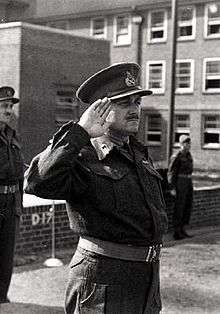Charles Foulkes (Canadian Army general)
| Charles Foulkes | |
|---|---|
 General Charles Foulkes | |
| Born |
3 January 1903 Stockton-on-Tees, England |
| Died |
12 September 1969 (aged 66) Ottawa, Ontario, Canada |
| Allegiance |
|
| Service/branch |
|
| Years of service | 1926–1960 |
| Rank | General |
| Unit | The Royal Canadian Regiment |
| Commands held |
Chief of the General Staff Chairman of the Chiefs of Staff I Canadian Corps |
| Battles/wars | World War II |
| Awards |
Companion of the Order of Canada Companion of the Order of the Bath Commander of the Order of the British Empire Distinguished Service Order Canadian Forces Decoration Commander of the Legion of Honour (France) |
General Charles Foulkes, CC, CB, CBE, DSO, CD (3 January 1903 – 12 September 1969) was a British-Canadian soldier, and an officer of The Royal Canadian Regiment.
Military career
Foulkes was born in Stockton-on-Tees, England and joined the Canadian Army in 1926.[1] In 1937 he attended the Staff College in Camberley, England.[1]
In 1939, Foulkes was serving as a major with the 3rd Brigade of the 1st Canadian Infantry Division.[1] He went on to be a General Staff Officer with 3rd Canadian Infantry Division.[1] After serving as a Brigade Commander from August 1942, he was appointed General Officer Commanding 2nd Canadian Infantry Division in January 1944 and led the division through the Normandy Campaign.[1] In November 1944 he was made General Officer Commanding I Canadian Corps in Italy.[1]
On 5 May 1945, Foulkes summoned German General Blaskowitz to the Hotel de Wereld ("Hotel the World") in Wageningen to discuss the surrender of German forces in the Netherlands. His Royal Highness Prince Bernhard, acting as commander in chief of the Dutch Interior Forces, attended the meeting as well. Blaskowitz agreed with all of the proposals made by Foulkes. However, nowhere in the building – some sources claim: nowhere in the whole town – could a typewriter be found. Thus the surrender document could not be typed. The next day both parties returned, and in the presence of both General Foulkes and Prince Bernhard, Blaskowitz signed the surrender document which in the meantime had been typed.[2]

After the war, Foulkes was appointed Chief of the General Staff and, in 1951, the first Chairman of the Chiefs of Staff.[1] He retired in 1960.[1]
In 1968 he was made a Companion of the Order of Canada. He taught at Carleton University in 1968 and 1969.[3] He died in Ottawa in 1969.
His medals and other personal artifacts are on display at the Royal Canadian Regiment Museum in London, Ontario.
References
- 1 2 3 4 5 6 7 8 Juno Beach Centre Biography
- ↑ Monument Wageningen
- ↑ "Archived copy". Archived from the original on 12 November 2012. Retrieved 2012-11-04.
External links
| Military offices | ||
|---|---|---|
| Preceded by John Carl Murchie |
Chief of the General Staff 21 August 1945 – 1 February 1951 |
Succeeded by Guy Granville Simonds |